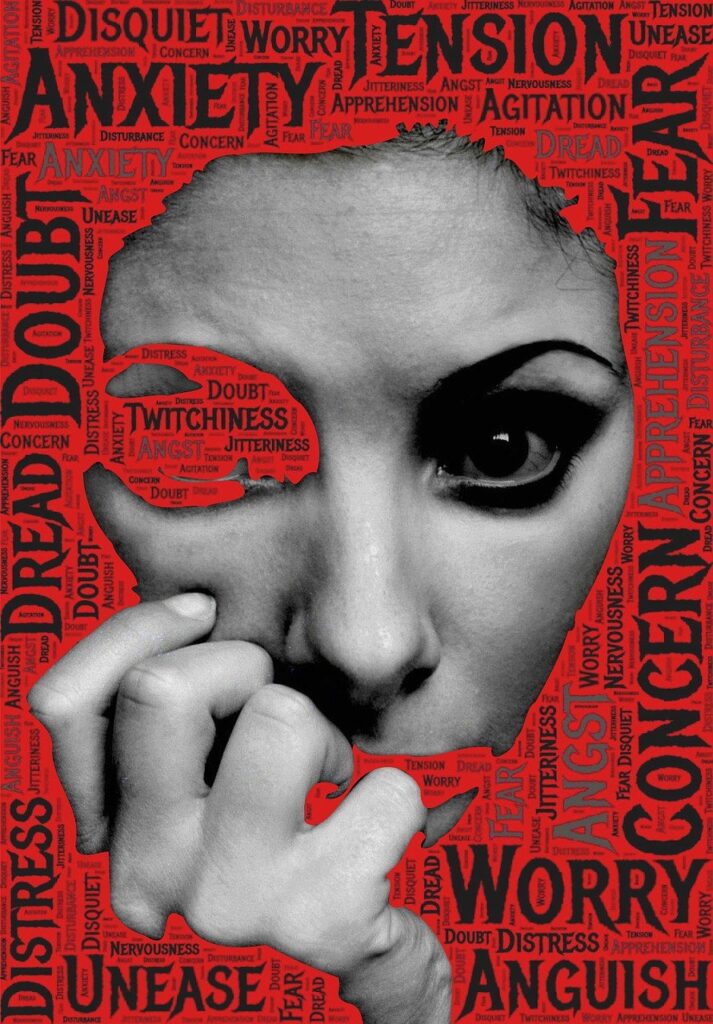
Anxiety is like a gnat you can’t get rid of. From personal experience, I swat at it, but it never goes away. Nevertheless, I walk around interacting with others, while my stomach is in knots and butterflies are bumping into each other, trying to get out! And I have a constant gnat flying over my head. Ugh…
As a perpetual people pleaser, this is where my anxiety started, trying to please others. Consequently, I’m sure you can pinpoint to when your anxiety started too or can you. If not, I am asking you to dig into your roots and into your soul, to locate this event. Why, so you can reflect on that time in your life and celebrate yourself for coming this far!
Anxiety is a lot like a toddler. It never stops talking, tells you you’re wrong about everything, and wakes you up at 3 a.m.”
— Anonymous
I don’t feel the need to hash out the symptoms of anxiety, I think we go it. But, for us everyday people, I do want to encourage you to work out your little “funny dos” as my doctor would say.
For some of us, anxiety is a part of our personality, it’s like an extra limb really. We carry it around every day. But is it possible to at least give ourselves a break of the tiredness anxiety creates? I think so anyway.
As I have gotten older and matured a little and after losing my mom in 2019, I wanted to really get to the heart of my anxiety, and this is what I found out at least about where mine started.
These are the top 3 reasons in my experience as to why I carry the anxiety I do inside. Maybe something will resonate with you. I may have forgotten along the way, but I sure do know it now.
1. Unrealistic Expectations
Unrealistic expectations and anxiety intertwine with one another. It’s done in both our personal lives and our professional lives. Sometimes expectations are placed on us that we know are impossible to achieve, especially at work.
Let me give you an example, I held a sales position in an underserved territory, the expectation was 30 referrals a month. First it was unrealistic and unrealized to this day. Sometimes we are set up to fail without any guard rails. Meaning, I had a manager who lived in Tennessee and didn’t know anything about the territory and wasn’t willing to listen. I made a conscious decision to save my sanity. I quit; it was time to go… it was my last position in sales.
People Pleaser
People pleasers are perfectionist as well, and it creates unnecessary stress and anxiety. Let things go, don’t drag it around. Life actually is better in all its imperfection. Perfectionists may constantly worry about making mistakes or not meeting their own lofty standards, this one I have definitely let go of. I encourage you to do the same. Most of the time what you consider just adequate is perfect to others. Remember this. You will not be able to please everyone, lose that burden, please yourself.
Fear of Failure
Fear of failure is a silent killer in itself, having unrealistic expectations can create a fear of failure. The anticipation of not meeting these expectations can and will lead to anxiety, preventing you from taking risks or trying new things. And feeling like you’re not good enough, the worst ever! Listen to me, YOU ARE MORE THAN ENOUGH!! Rinse & Repeat.
Making Constant Comparisons
Constant comparisons, I’m asking you to stop. Don’t worry about who’s doing what on social media. Look, you are an individual, with different DNA. Yes, there are going to be people who can do it better, but they can’t do it like you can. You will find your own tribe, trust me on this one. You will. Concentrate on you, and only you.
Do you think Taylor Swift cares about what people think? Yes, she does, but she doesn’t concentrate on what people do or say about her. She flies her own freak flag and has a wonderful time doing it. I admire her for that.
What can you do better?
- Set Realistic Goals: Encourage setting achievable, realistic goals. Break larger goals into smaller, manageable steps to avoid feeling overwhelmed.
- Challenge Irrational Thoughts: Practice recognizing and challenging irrational or overly negative thoughts. This can help shift perspectives and reduce anxiety associated with unrealistic expectations.
- Cultivate Self-Compassion: Foster a compassionate attitude toward yourself. Understand that everyone has limitations, and it’s okay not to be perfect. Embrace mistakes as opportunities for growth.
2. Lack of Preparation
Ok, are you a constant procrastinator? Do you wait till the last minute to do something? I must say, I can do my best work under some stressful deadlines. However, this feeling will get old.
Get Prepared
Get prepared. Do it early. Otherwise, those knots and butterflies are going to bang louder in your stomach and creep into your head. When you’re unprepared, there’s often a sense of uncertainty about what to expect. This lack of clarity can fuel anxious thoughts and make it challenging to cope with the unknown. And those of us with anxiety are constantly wanting to be in the “know.” So be in the know, by being at least half prepared anyway.
Unpreparedness
Unpreparedness can lead to feeling overwhelmed, especially if tasks or situations seem insurmountable due to lack of planning. The fear of not being able to handle the situation can intensify anxiety. Then you just shut down, and exit right out the door, without anything getting done. If your cortisol levels stay at an all-time high, this leads to health problems you don’t want. Trust me on this one. So, get this done. Make a list.
What can you do better?
- Prioritize and Plan: Break down tasks into smaller, manageable steps. Prioritize them based on importance and deadlines. Creating a plan helps organize your thoughts and actions, reducing the feeling of being overwhelmed.
- Build a Routine: Establishing a routine can create a sense of structure and predictability. Knowing what to expect in your daily or weekly schedule can alleviate anxiety related to the unknown.
- Learn from Past Experiences: Reflect on situations where lack of preparation led to anxiety. Use these experiences as learning opportunities to improve future planning and reduce anxiety.
- Mindfulness Techniques: Incorporate mindfulness practices to stay present and focused. Techniques such as deep breathing or meditation can help manage anxiety, especially in moments of unpreparedness.
- Time Management: Allocate specific time slots for different tasks and stick to your schedule. Effective time management enhances productivity, reduces stress, and gives you a sense of preparedness.
The Fear of the Unknown
I can “what if” myself to death. I can take one situation and think of a thousand outcomes. This is very common with people who experience anxiety.
In my experience, the fear of the unknown comes from not asking enough questions. Unimagined scenarios I make up in my head. But mostly the fear of losing control or being stuck or trapped somewhere. But I have learned different tools to conquer these pesty “funny dos.”
What can you do better?
- Grounding Techniques: Stay present by using grounding techniques, such as focusing on your senses or your breath. This can bring your attention back to the current moment. Bring yourself to the present, you’re ok…
- Envision Positive Outcomes: Instead of dwelling on negative scenarios, try to visualize positive outcomes. This can shift your mindset and reduce anxiety about the unknown. This is a very powerful technique; I suggest everyone learn this one.
- Knowledge is Power: Seek information about the unknown when possible. Understanding the situation better can provide a sense of control and alleviate anxiety. ASK QUESTIONS! or ASK BETTER QUESTIONS!
- Learn from Challenges: Cultivate a mindset of resilience by viewing challenges as opportunities for growth. This perspective can reduce fear of the unknown. You are stronger than you know.
- Gradual Exposure: If possible, expose yourself gradually to the unknown. Gradual exposure helps desensitize anxiety and build confidence over time. Life is going to deal you a different set of cards, every day, learn to understand you just can’t know it all.
Final Thoughts
Me and anxiety have now become distant friends. It still flies around my head, but it goes away sometimes. It goes on vacation and returns when I don’t take of myself. What about you? It’s been my cross to bear, but you know, I am worth the work, and you are too.
Things to remember
In the dance of life, anxiety often takes center stage, but you hold the power to lead. It’s time to turn your anxiety into a dance partner, guiding you through the twists and turns with grace. Acknowledge the kind of dance and music you are listening too. Know the patterns of the dances, practice mindful moves that are fluid throughout your body and soul. Learn new moves with uncertainty, picture your normal and your perfect life in your dance, choreographed by you. Build your dance troupe, solid and true. Most importantly, don’t forget to celebrate the beautiful…you as you dance.
Resources
- http://The Cognitive Behavioral Workbook for Anxiety: A Step-By-Step Program Paperback – November 1, 2014 by William J. Knaus EdD (Author), Jon Carlson PsyD EdD ABPP
- http://The Anxiety and Worry Workbook: The Cognitive Behavioral Solution David A. Clark , Aaron T. Beck
- We’ll chat soon,

